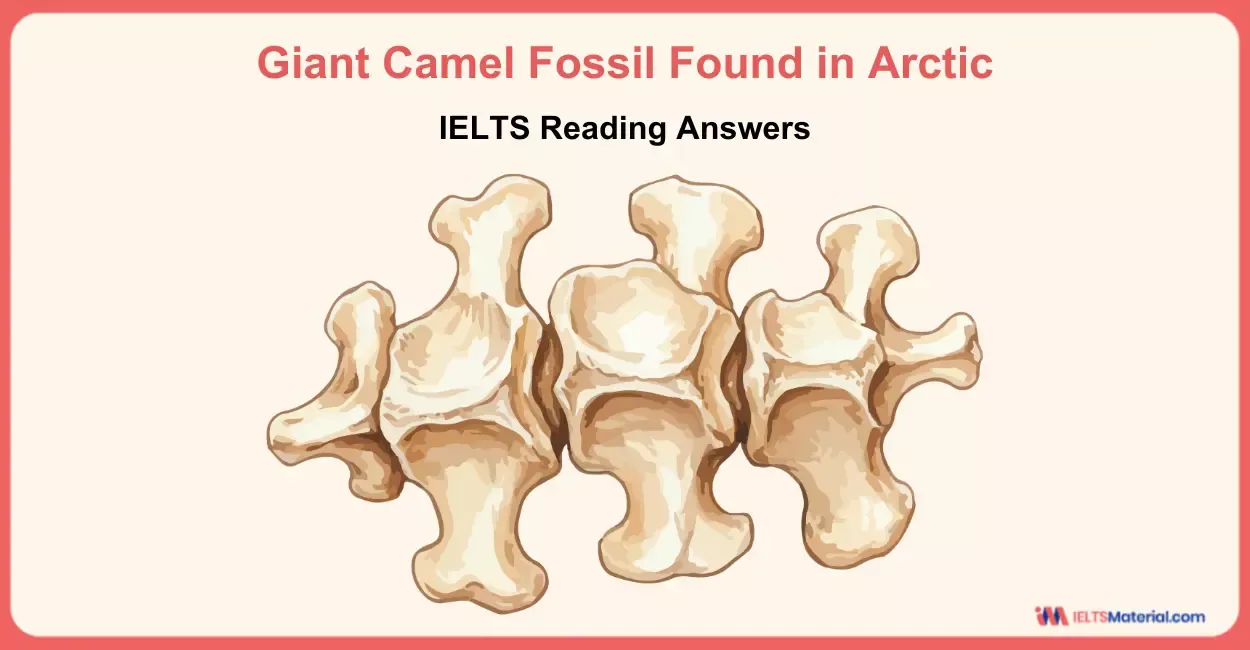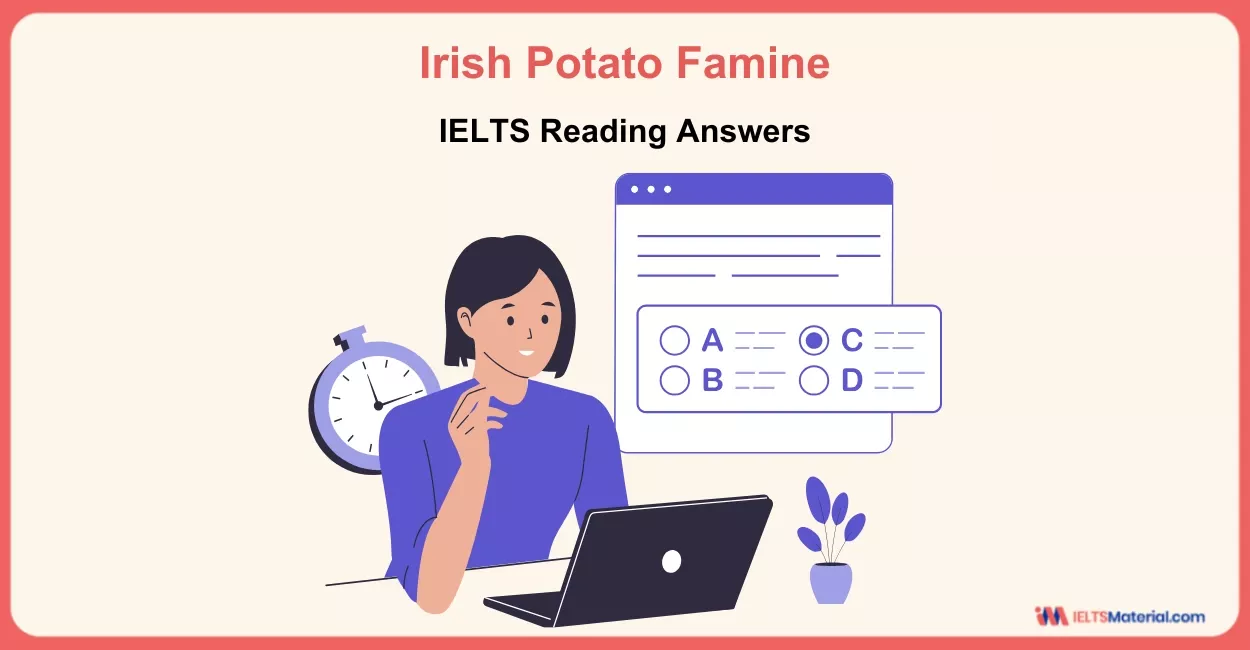Irish Potato Famine - IELTS Reading Answers
10 min read
Updated On
-
Copy link
Improve your skills at answering Matching Information and Matching Endings types of questions with the IELTS Reading passage, ‘Irish Potato Famine’. Learn how to answer questions while analyzing the answer, its location, and explanation to get a band 8+.
Table of Contents

Limited-Time Offer : Access a FREE 10-Day IELTS Study Plan!
Irish Potato Famine is a real Reading test passage that appeared in the IELTS. Your performance will be judged based on your accuracy, comprehension, and speed while reading passages and answering questions. Being aware of your assessment can help you channel your preparation toward specific strategies. In this way, you will improve reading speed while comprehending, and managing your time during the IELTS Reading exam. Knowing these criteria enables you to focus on what matters most for a higher band score.
Connect with our band 9 IELTS Trainers to crack your IELTS Reading in no time! Book a FREE Demo.
Types of Questions in IELTS Reading Passage ‘Irish Potato Famine’
Understanding question types is necessary to apply different strategies for each of them. Reviewing the question types before reading the passage will make you better at your concentration skills, sharpening of analysis, and enhancement of your reading performance. Below are the two question types which you will encounter as you dive into the Reading passage ‘Irish Potato Famine’.
The question types found in this passage are:
- ELTS Reading Matching Information [Q.16-20]
- IELTS Reading Matching Endings [Q.21-28]
How to Answer Questions in the IELTS Reading Passage ‘Irish Potato Famine’?
The question types require more than simple keyword scanning as they test your grasp of details and your ability to connect ideas. Knowing about these question types and what they require would help you to create targeted strategies during the IELTS Exam. The following strategies would also make your answers become more accurate and save time on the test.
|
Question Types |
Description |
Strategies |
|
Matching Information |
|
|
|
Matching Endings |
|
|
Curious to learn how to improve your reading skills to get a band 9? Check out the video below!
IELTS Reading Passage on ‘Irish Potato Famine’
You should spend about 20 minutes on Questions 16-28, which are based on the Reading Passage below.
Irish Potato Famine
A In the ten years following the Irish potato famine of 1845, over 750,000 Irish people died, including many of those who attempted to immigrate to countries such as the United States and Canada. Prior to the potato blight, one of the main concerns in Ireland was overpopulation. In the early 1500s, the country’s population was estimated at less than three million, but by 1840 this number had nearly tripled. The bountiful potato crop, which contains almost all of the nutrients that a person needs for survival, was largely to blame for the population growth. However, within five years of the failed crop of 1845, the population of Ireland was reduced by a quarter. A number of factors contributed to the plummet of the Irish population, namely the Irish dependency on the potato crop, the British tenure system, and the inadequate relief efforts of the English.
B It is not known exactly how or when the potato was first introduced to Europe, however, the general assumption is that it arrived on a Spanish ship sometime in the 1600s. For more than one hundred years, Europeans believed that potatoes belonged to a botanical family of a poisonous breed. It was not until Marie Antoinette wore potato blossoms in her hair in the mid-eighteenth century that potatoes became a novelty. By the late 1700s, the dietary value of the potato had been discovered, and the monarchs of Europe ordered the vegetable to be widely planted.
C By 1800, the vast majority of the Irish population had become dependent on the potato as its primary staple. It wasn’t uncommon for an Irish potato farmer to consume more than six pounds of potatoes a day. Families stored potatoes for the winter and even fed potatoes to their livestock. Because of this dependency, the unexpected potato blight of 1845 devastated the Irish. Investigators at first suggested that the blight was caused by static energy, smoke from railroad trains, or vapors from underground volcanoes; however, the root cause was later discovered as an airborne fungus that traveled from Mexico. Not only did the disease destroy the potato crops, it also infected all of the potatoes in storage at the time. Their families were dying from famine, but weakened farmers had retained little of their agricultural skills to harvest other crops. Those who did manage to grow things such as oats, wheat, and barley relied on earnings from these exported crops to keep their rented homes.
D While the potato blight generated mass starvation among the Irish, the people were held captive to their poverty by the British tenure system. Following the Napoleonic Wars of 1815, the English had turned their focus to their colonial land holdings. British landowners realized that the best way to profit from these holdings was to extract the resources and exports and charge expensive rents and taxes for people to live on the land. Under the tenure system, Protestant landlords owned 95 percent of the Irish land, which was divided up into five-acre plots for the people to live and farm on. As the population of Ireland grew, however, the plots were continuously subdivided into smaller parcels. Living conditions declined dramatically, and families were forced to move to less fertile land where almost nothing but the potato would grow.
E During this same period of colonization. The Penal Laws were also instituted as a means of weakening the Irish spirit. Under the Penal Laws, Irish peasants were denied basic human rights, such as the right to speak their own native language, seek certain kinds of employment, practice their faith, receive education, and own land. Despite the famine that was devastating Ireland, the landlords had little compassion or sympathy for tenants unable to pay their rent. Approximately 500,000 Irish tenants were evicted by their landlords between 1845 and 1847. Many of these people also had their homes burned down and were put in jail for overdue rent.
F The majority of the British officials in the 1840s adopted the laissez-faire philosophy, which supported a policy of nonintervention in the Irish plight. Prime Minister Sir Robert Peel was an exception. He showed compassion toward the Irish by making a move to repeal the Corn Laws, which had been put in place to protect British grain producers from the competition of foreign markets. For this hasty decision, Peel quickly lost the support of the British people and was forced to resign. The new Prime Minister, Lord John Russell, allowed assistant Charles Trevelyan to take complete control over all of the relief efforts in Ireland. Trevelyan believed that the Irish situation should be left to Providence. Claiming that it would be dangerous to let the Irish become dependent on other countries, he even took steps to close food depots that were selling corn and to redirect shipments of com that were already on their way to Ireland. A few relief programs were eventually implemented, such as soup kitchens and 1 workhouses; however, these were poorly run institutions that facilitated the spread of disease, tore apart families, and offered inadequate food supplies considering the extent of Ireland’s shortages.
G Many of the effects of the Irish potato famine are still evident today. Descendants of those who fled Ireland during the 1840s are dispersed all over the world. Some of the homes that were evacuated by absentee landlords still sit abandoned in the Irish hills. A number of Irish dependents still carry animosity toward the British for not putting people before politics. The potato blight itself still plagues the Irish people during certain growing seasons when weather conditions are favorable for the fungus to thrive.
Questions 16-20
The passage has seven paragraphs, A-G. Which paragraph contains the following information? Write the correct letter in boxes 16-20 on your Answer Sheet.
16 the position of the British government towards the potato famine
17 a description of the system of land ownership in Ireland
18 early European attitudes toward the potato
19 explanation of the lack of legal protection for Irish peasants
20 the importance of the potato in Irish society
Questions 21-28
Complete each sentence with the correct ending, A-L from the box at the top of the next page. Write the correct letter in boxes 21-28 on your Answer Sheet. There are more endings than sentences, so you won't use them all.
|
Sentence Endings
|
21 At first Europeans didn't eat potatoes
22 European monarchs encouraged potato growing
23 The potato blight was devastating to the Irish
24 Farmers who grew oats, wheat, and barley didn’t eat these crops
25 Many Irish farmers lived on infertile areas
26 Many Irish farmers were arrested
27 Sir Robert Peel lost his position as prime minister
28 Soup kitchens and workhouses didn’t relieve the suffering
Grab the IELTS Reading (Academic) Test Guide: Essential Tips, Strategies, and Practice Tests” (April-June 2025) today!
Answers with Location and Explanation on Passage ‘Irish Potato Famine’
Here are the answers, their locations, and explanations for the IELTS passage, ‘Irish Potato Famine’. This step is very important to identify weaknesses and build better strategies. Through consistent practice of this, you will not only master question-solving skills but also closer to achieving a high IELTS Band Score.
|
Answer |
Question Type |
Answer Location |
Answer Explanation |
|
16. F |
Matching Information |
Paragraph F |
Paragraph F mentions that the majority of the ‘British officials in the 1840s adopted the laissez-faire philosophy’... Hence, the answer is F. |
|
17. D |
Matching Information |
Paragraph D |
Paragraph D explains that the potato blight generated mass starvation among the Irish... Hence, the answer is D. |
|
18. B |
Matching Information |
Paragraph B |
Paragraph B refers to the fact that it is unknown exactly ‘how or when the potato’ was first introduced to Europe... Hence, the answer is B. |
|
19. E |
Matching Information |
Paragraph E |
Paragraph E points out that the ‘Penal Laws were also instituted’ as a means of weakening the Irish spirit... Hence, the answer is E. |
|
20. C |
Matching Information |
Paragraph C |
Paragraph C states that by 1800, the ‘vast majority of the Irish population’ had become dependent on the potato as its primary staple... Hence, the answer is C. |
|
21. I |
Matching Sentence Endings |
Paragraph B |
Paragraph B informs that for more than one hundred years, Europeans believed that potatoes were poisonous... Hence, the answer is I. |
|
22. K |
Matching Sentence Endings |
Paragraph B |
Paragraph B notes that by the late 1700s, the dietary value of the potato had been discovered... Hence, the answer is K. |
|
23. C |
Matching Sentence Endings |
Paragraph C |
Paragraph C reveals that by 1800, the vast majority of the Irish population had become dependent on the potato... Hence, the answer is C. |
|
24. E |
Matching Sentence Endings |
Paragraph C |
In the last sentence of paragraph C, the writer says those who did manage to grow oats, wheat, and barley relied on earnings from exports... Hence, the answer is E. |
|
25. G |
Matching Sentence Endings |
Paragraph D |
Paragraph D shows that the plots were continuously subdivided, living conditions declined, and families had less fertile land... Hence, the answer is G. |
|
26. A |
Matching Sentence Endings |
Paragraph E |
Paragraph E has the information that landlords had very little compassion for their tenants who were not able to pay rent. |
|
27. H |
Matching Sentence Endings |
Paragraph F |
Paragraph F discusses that PM Peel’s efforts to help the Irish were unpopular among the British... Hence, the answer is H. |
|
28. F |
Matching Sentence Endings |
Paragraph F |
Paragraph F states that few relief programs were poorly managed, leading to disease and inadequate supplies... Hence, the answer is F. |
Enroll into our Free IELTS Webinar and learn more about techniques to improve your reading speed.
To score a higher band, strategy, focus, and continuous practice are required rather than just scanning texts to get answers. Each practice passage such as ‘Irish Potato Famine’ lets you explore patterns in question types, find information, and helps you to analyze and improve comprehension. Such continuous learning sessions would transform the practice into a path to success, helping you build confidence to achieve higher band scores.
Check More IELTS Reading Answers
Also Check:
Practice IELTS Reading based on question types

Start Preparing for IELTS: Get Your 10-Day Study Plan Today!
Explore other Reading Practice Tests

Kasturika Samanta

Kasturika Samanta

Nehasri Ravishenbagam
Recent Articles

Nehasri Ravishenbagam

Haniya Yashfeen

Haniya Yashfeen

Haniya Yashfeen





Post your Comments